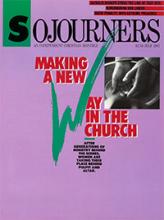AS I HUNG UP THE PHONE, I reflected on the conversation I d just finished with the director of the Metropolitan Detroit Lutheran Parish, a coalition of 15 churches that includes Christ Church, the congregation I serve. One of the other congregations in the coalition was interviewing a female pastoral candidate.
Apparently some of the members of the call committee had concerns about the ability of a woman to do some of the things inner-city pastors are called to do, specifically living in the church's neighborhood and visiting members and prospective members in that neighborhood. The director wondered if some members of Christ Church would be willing to meet with the call committee and answer the question, "What's it like having a woman as your pastor?"
I had said yes without even thinking about it. Yes, because the people I serve are uniformly ready to go anywhere at any time to help anyone. I knew they'd be willing to share their experience.
But now I wondered, why? Why should such a meeting be necessary? If a white congregation was interviewing a black candidate, would such a discussion even be allowed? Why wasn't the word of the director, that he was recommending the most qualified candidate, enough?
Should I raise these questions with the director, saying no one from Christ Church would attend such a meeting? Or was our participation the best way to help a sister receive a call? And the most searing question of all: Was I afraid to get involved because, even after three-and-a-half years together, I still didn't know what members really thought and felt about having a woman minister?
Read the Full Article

